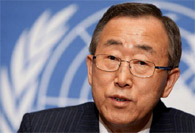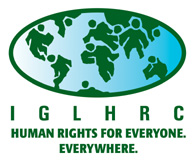The latest amendment was introduced by the U.S. ambassador to the United Nations Susan Rice who said said she was "incensed" at the move to remove the sexual orientation clause and vowed to restore the original language in a U.S.-sponsored amendment. Prior to its removal, the original 2008 declaration had included an explicit reference to killings committed because of the victims' sexual orientation alongside killings for racial, national, ethnic, religious, or linguistic reasons, and killings of refugees, indigenous people, and other groups.

The resolution was adopted on Dec 21 by the 192-member General Assembly on a vote of 93 for and 55 against, with 27 nations abstaining.
Gay rights groups, who worked ahead of the vote to lobby countries that had abstained earlier in hopes of getting them to approve a U.S.-sponsored amendment, naturally welcomed the result. Albania, Colombia, Rwanda and South Africa were reportedly among the countries the US or rights groups have persuaded to approve the amendment.
Boris Dittrich, director of the gay rights program at Human Rights Watch, credited Rice with introducing the new amendment and told The Washington Post was "relieved" by the result. "The resolution does justice to gays, lesbians and transgender people in countries where they are targeted for assaults and killings," Dittrich said. "Hate crimes on the basis of sexual orientation or gender identity must be countered just like hate crimes on the basis of race or religion."
The IGLHRC [with ARC International, CariFLAGS, COC Nederland, International Day to End Homophobia and Transphobia (IDAHO) and International Lesbian, Gay, Bisexual, Transgender and Intersex Association (ILGA) World] issued a joint statement on Dec 21, 2010 highlighting the efforts of a massive mobilisation effort by civil society groups including through action alerts issued by ARC International and by the International Gay and Lesbian Human Rights Commission:
On Tuesday, the United Nations General Assembly (UNGA) voted overwhelmingly in favor of restoring reference to "sexual orientation" in a high-profile resolution condemning extrajudicial, summary or arbitrary executions. The reference to sexual orientation had been removed by an earlier amendment at the committee level by governments opposed to ensuring protection for individuals targeted because of their actual or perceived sexual orientation. The vote - which passed 93 to 55, with 27 abstentions and 17 absent or not voting – demonstrated that efforts to exclude vulnerable groups from human rights protections at the UN will be vigorously opposed.

Today's dramatic vote comes after a UN General Assembly sub-committee responsible for human rights issues voted in November to remove the reference to "sexual orientation" from a paragraph enumerating vulnerable populations in the resolution condemning extrajudicial, summary or arbitrary executions.
The earlier removal of the reference to sexual orientation, approved in committee by a vote of 79 in favor, 70 opposed, with 17 abstaining and 26 not voting, was met by an international outcry – including from governments such as the United States who vowed to re-open the issue.
Introducing today's amendment, the representative of the United States called on governments to acknowledge that all persons have the right to be free from extrajudicial, summary or arbitrary executions, including those targeted because of their sexual orientation. The US later went on to note that the voices of civil society and human rights defenders had been heard. They also called on UN Member States to sign onto the 2008 General Assembly declaration confirming that international human rights protections include protection from violence and discrimination on the basis of sexual orientation and gender identity.
The discriminatory vote in November prompted a massive mobilization by civil society including through action alerts issued by ARC International and by the International Gay and Lesbian Human Rights Commission – an organization which, in July, faced unsuccessful efforts by the same conservative forces to prevent it from gaining official NGO status at the UN.
"This, of course, could not have happened without the concerted and passionate efforts of several governments. But what this victory also demonstrates is the power of civil society at the UN and working across countries and regions to demand that their own governments vote to protect LGBT lives." said Cary Alan Johnson, Executive Director of the International Gay and Lesbian Human Rights Commission (IGLHRC). "The outpouring of support from the international community sent the strong message to our representatives at the UN that it is unacceptable to make invisible the deadly violence LGBT people face because of their actual or perceived sexual orientation."
Following the November vote, civil society from around the world – including strong coalitions from the Global South – were vocal in pressuring their governments to support critical human rights protections for LGBT people. As the ad hoc civil society coalition from South Africa noted:
"The November amendment … aggravates an already difficult environment for gay, lesbian, bisexual, and transgender and intersex (LGBTI) people and their defenders, who live in continual fear of violent attack and experience discrimination throughout Africa and many other parts of the world. ...and ignores the overwhelming evidence that people are routinely killed around the world because of their actual or perceived sexual orientation."
Following today's successful inclusion of language on sexual orientation, the resolution itself passed with a vote of 122 in favor and 1 against (with 62 abstentions and 17 absences). It now states, "To ensure the effective protection of the right to life of all persons under their jurisdiction and to investigate promptly and thoroughly all killings, including those targeted at specific groups of persons, such as...killings of persons belonging to national or ethnic, religious and linguistic minorities, or because of their sexual orientation...."
This marks a return to previous inclusive language that governments in the UN have supported for close to a decade. These abuses have also been consistently documented by UN Special Rapporteurs in reports to the UN Human Rights Council and its predecessor, the Commission on Human Rights, a point noted in today's statement by Belgium on behalf of the European Union.
Regrettably, governments have so far failed to include in the resolution mention of, or specific protection around, killings committed on the basis of gender identity. This is despite the fact that transgender people around the world are among those most vulnerable to violence and killings.
Today's vote to reinstate protections passed with broad cross-regional support. Many states took the floor in support of inclusion of reference to the vulnerability of LGBT people and calling for a stronger response against killings on the basis of sexual orientation that take place all too frequently around the world.
Several swing states indicated a change from their votes in November. South Africa, a key vote from the African region, stated that in today's vote they were "guided by our Constitution that guarantees the right to life" and that "no killing of human beings can be justified whatsoever." Colombia, which abstained on the earlier vote, also offered its unequivocal support during the new vote.
Although several countries claimed a supposed lack of a definition of sexual orientation in international law as a reason for their opposition, countries such as Rwanda firmly rejected this saying: "Take my word, a human group need not be legally defined to be the victim of executions and massacres as those that target their members have [already] previously defined [them]. Rwanda has also had this bitter experience sixteen years ago. It is for this that the Delegation of Rwanda will vote for this amendment and calls on other delegations to do likewise."
Today's vote affirms the message of UN Secretary Ban Ki Moon, who on International Human Rights Day, delivered an unequivocal statement - much quoted by States supporting the amendment - on the obligation of the UN and its member states to end violence against lesbian, gay, bisexual and transgender people.
He declared, "Together, we seek the repeal of laws that criminalize homosexuality, that permit discrimination on the basis of sexual orientation or gender identity, that encourage violence. People were not put on this planet to live in fear of their fellow human beings."
Watch the video from Human Rights Day Event and read UN Secretary Ban Ki Moon's full statement.
Read the formal communications from human rights defenders in countries that lobbied their governments on this vote (PDF).
In favor of amendment restoring sexual orientation to UNGA resolution on executions (93):
Albania, Andorra, Angola, Antigua-Barbuda, Argentina, Armenia, Australia, Austria, Bahamas, Barbados, Belgium, Belize, Bolivia, Bosnia-Herzegovina, Brazil, Bulgaria, Canada, Cape Verde, Chile, Colombia, Costa Rica, Croatia, Cyprus, Czech Republic, Denmark, Dominica, Dominican Republic, Ecuador, El Salvador, Estonia, Fiji, Finland, France, Georgia, Germany, Greece, Grenada, Guatemala, Honduras, Hungary, Iceland, India, Ireland, Israel, Italy, Japan, Latvia, Liechtenstein, Lithuania, Luxembourg, Malta, Mauritius, Marshall Island, Mexico, Micronesia, Monaco, Montenegro, Nauru, Nepal, Netherlands, New Zealand, Nicaragua, Norway, Palau, Panama, Papua New Guinea, Paraguay, Peru, Poland, Portugal, Republic of Korea, Republic of Moldova, Romania, Rwanda, Saint Kitts and Nevis, Samoa, San Marino, Serbia, Slovakia, Slovenia, South Africa, Spain, Sweden, Switzerland, The Former Yugoslav Republic of Macedonia, Timor-Leste, Tonga, Ukraine, United Kingdom, United States, Uruguay, Vanuatu, Venezuela
Opposed to amendment (55):
Afghanistan, Algeria, Azerbaijan, Bahrain, Bangladesh, Benin, Botswana, Brunei Dar-Sala, Burkina Faso, Burundi, China, Comoros, Congo, Democratic People's Republic of Korea, Democratic Republic of Congo, Djibouti, Egypt, Gambia, Ghana, Indonesia, Iran, Iraq, Jordan, Kazakhstan, Kuwait, Lebanon, Libya, Malawi, Malaysia, Mauritania, Morocco, Namibia, Niger, Nigeria, Oman, Pakistan, Qatar, Russia, Saint Lucia, Saudi Arabia, Senegal, Sierra Leone, Solomon Islands, Somalia, Sudan, Syria, Swaziland, Tajikistan, Tunisia, Uganda, United Arab Emirates, Tanzania, Yemen, Zambia, Zimbabwe
Abstained (27):
Belarus, Bhutan, Cambodia, Eritrea, Guinea, Guinea-Bissau, Guyana, Haiti, Jamaica, Kenya, Lao, Lesotho, Liberia, Maldives, Mali, Mongolia, Mozambique, Philippines, Saint Vincent and the Grenadines, Sao Tome Principe, Singapore, Sri Lanka, Suriname, Thailand, Togo, Trinidad and Tobago, Vietnam
Did not vote/Absent (17):
Cameroon, Central African Republic, Chad, Cote D'Ivoire, Cuba, Equatorial Guinea, Ethiopia, Gabon, Kiribati, Kyrgyzstan, Madagascar, Myanmar, Seychelles, Turkey, Turkmenistan, Tuvalu, Uzbekistan
